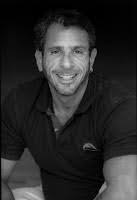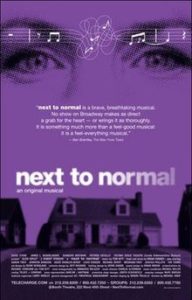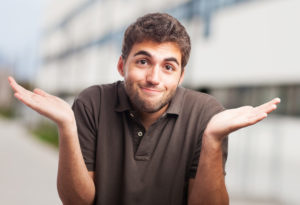Mental Health During COVID-19: Next to Normal
Those who know me well know that I have a life-long obsession with Broadway musicals, recently having completed writing the book, music, and lyrics for a musical of my own, “On the Boulevard,” which takes place in my own very home of West Hollywood, California, a modern re-telling of the classic “Pygmalion” tale of Cinderella-like transformation, with two gay male lead characters. Sure, being a “show queen” is a gay stereotype, but as a gay men’s specialist psychotherapist and coach for 28 years, I’m focused on a lot of things associated with gay men. Especially their mental health.

I had a mentor early in my career, the late Michael Shernoff, LCSW, a gay men’s specialist therapist for decades in New York, who once said, “There is a show tune for every occasion” (he was a musicals fan, too – and, like me, a professor of social work, and author. I used to read his articles or watch him speak at a conference, and ask, “Can I be you when I grow up?” (I was already about 30); and I’m proud to say that I think I have, trying hard to carry on his legacy and be of service to the LGBT community I care about very deeply). And as we all endure the current global coronavirus/COVID-19 pandemic, I find there’s even a show tune about that, with clues in it about how gay men (and others) can serve their mental health while other professionals attend to our collective physical health.
In 2009, Alice Ripley won the Tony Award for Best Lead Actress in a Musical for the Pulitzer-Prize-winning musical, “Next to Normal,”, about a woman with Bipolar Disorder and her family (a musical about a psychiatric illness? That’s my whole in a nutshell, right there!). And as we all adjust to life under “stay at home” conditions all over the world, makeshift masks and all, in an effort to slow the spread of COVID-19, that phrase – “next to normal” – comes to mind as a theme or mantra, or even a call to arms.
In a previous article, I wrote about the mental health aspects of working from home for gay men, taking tips on working from home from a variety of readily-available websites and putting my spin on them from both mental health and gay male points of view (again, my life in a nutshell, right there). And while the adjustment to working from home isn’t possible, sadly, for so many types of jobs, it can work for certain white-collar workers in many different types of companies, organizations, and institutions. And for those who can’t work from home, or have lost jobs, the sometimes-fiery social worker socialist activist in me tries to advocate for wage replacement, rent forbearance, and other public assistance that literally helps keep people alive. And it’s because COVID-19 affects all of us, the world over, physically, socially, emotionally, and economically, that we need to attend to our individual and collective mental health. But how?

In my searching my mind for the “how,” I reflect on the recent sessions I’ve had with my clients in my practice, which is both for psychotherapy (as such) in California (where I’m licensed) as well as the life/career/relationship coaching I provide to gay men in other states or countries, who are sometimes in rural areas where a “gay men’s specialist therapist or coach” is nowhere near to be found. With each local psychotherapy client , and with each session, I notice how the person I was used to seeing in my office in three dimensions – seeing what they wore, what they carried with them into the office, and every detail of their facial expressions not in pixels on a device screen, like now, but in real life. I realize that seeing them online through webcam platforms is so much like the work we’ve been doing in session, week by week, with the same cast of characters discussed and assessing progress on various treatment goals, with the same sound and cadence of their voice. It wasn’t “normal” office work, but it was still productive. It wasn’t work as “normal”, but it was something “next to” normal in a way to conduct psychotherapy.
And isn’t that what we’re all doing? My clients are having therapy, but in a different way. I’m enjoying some of my favorite foods – but not at the restaurant, with the cute waiters and the jovial social atmosphere, but in take-out. I sometimes go to my office nearby my home to get extra elbow-room and quiet, and work from my various webcam platforms there with some elaborate equipment like an external mic and screen, but the usual Los Angeles bumper-to-bumper traffic is gone. It’s not my normal commute, but it’s the same route – so it’s “next to” normal. My husband and I hold hands as we watch a movie on Netflix or Blu-Ray at home, but it’s not like normal, going to the Arclight Cinemas in Hollywood or the Sunset 5 complex in West Hollywood, like normal, but I make home-made popcorn with my increasingly-inventive spice combinations and vegan butter: it’s “next to” normal.
It’s this “next to normal” mind-set that I think will see us through. Because this pandemic and its self-quarantine, lockdown-like conditions are not going away anytime soon. Certainly not soon enough. I was telling clients this week that sometimes when I travel (which is not that often under “normal” conditions), if I stay someplace for one or two nights, I live out of my suitcase and don’t bother to unpack. But if I stay somewhere for a week or so, I might really settle in. Unpack the suitcase. Make a place my home-away-from-home for a while. Take off my jacket, and stay awhile. That’s what we’re all doing now; this is not a brief temporary “hold your breath for a second” thing; it’s what I call a “temporary, new normal.”

So we each need to ask ourselves, What is our own temporary new normal? What is the new way we work? What is the new way we eat? What is the new way we relate to our home space? What is the new way we relate to our coworkers, friends, family, neighbors, and local community? For so many gay men, especially in urban centers like Los Angeles/West Hollywood, but also others nationwide or worldwide like the Castro, Hell’s Kitchen, Buckhead, South Beach, Dupont Circle, Halstead, Vauxhall, Marais – where so many things we took for granted are gone: Going to the gym. Going to the movies. Going to a bar. Dancing at a club. Hooking up. Game night. Bathhouses. House parties. Birthday parties. Drag shows. 12-Step meetings. Support groups. Chorus rehearsal. Theatre shows. Beach days. Pride celebrations. Leather contests. Art house movie screenings. Fundraisers. Too many to list that embody gay life for not all, but certainly many. Those would be things we might do in normal times, but what’s next to normal that we can do instead?
For the past couple of weeks, I’ve had Saturday Night Happy Hour on Zoom with several other gay male couples and some straight ally friends. I’ve read about how some clubs are starting “virtual” club nights, where you can tip your favorite go-go boy via Venmo. One of my clients played an online game (“Bad People”, which sounds hysterically funny) with his usual gay-mer friends. Another had poker night, but online – “next to” their normal poker night. Another friend gave an online update of city business after attending his usual morning 12-Step meeting – online. Facebook and Instagram are ubiquitously full of ads for elastic bands, push-up handles, and adjustable dumbbell sets for home workouts.
So, each of us is left to take how our lives are right now, and translate them as if we were translating a document from one language to another. What is “next to normal” for us as individuals? What do we need? How can we creatively translate the way we used to live, love, and work for the self-quarantine age? For some things, there are no substitutes for the list above. And that’s not normal. For those, we have to acknowledge the grief and mourning process for things we’ve lost, not knowing exactly when they will return (which is perhaps the hardest part; if we know it’s “temporary”, but we don’t know for how long, that can feel a lot like “permanent”). Therapists know that dealing with grief and bereavement is a paradox: the more we try to suppress or ignore it, the more it will affect our functioning. Ironically, the more we acknowledge, validate, and process through it, the faster we will heal and arrive at a new way of functioning after the loss. For those losses, we need support, even just the simple validation that, yes, this indeed sucks, for everyone who has lost recreation, a livelihood, a loved one, or their lives.
But for the majority, even those who have had or even will have COVID-19, the odds are thankfully well in our favor that we will survive – sometimes even asymptomatically. I now know 5 of my current (gay male) clients (between about ages 30 to 45) who have had it and recovered, or who test positive for it and never had symptoms. One was very ill but recovered and is now the (online) workaholic (I’m teasing you, “J”, you know who you are) that he always was. Maybe my clients who are used to jet-setting around the country or the world for work are not racking up frequent flyer miles as normal, but their “next to” normal career still gets plenty of impressive work done.
Darwin said it was not the strongest of species who survive over history, but the ones with the best ability to adapt. When the going gets tough, the tough get going. The only way out, is through. This, too, shall pass. As cliché – almost glib – as these phrases can sound, social workers and other therapist/coaches like me invoke them not to deny or invalidate real loss and suffering, but to encourage a healthy, adaptive coping. Yes, it sucks we are not “normal” now, but maybe, with ingenuity, creativity, and the perseverance gay men know all about (especially those of us who lived through the AIDS crisis “bad years” between 1981 and 1995, or myself, living with HIV and all its “trimmings” (like an absurd Thanksgiving dinner) for now 30 years this year), we can get the “next best thing” until it’s time to put this COVID-19 mishegas, like so many things gay men have had to endure in my lifetime alone (sodomy laws, lack of marriage equality, bar raids, bashings, murders, “Burn in Hell” signs, “f-g” jokes, Republicans, opportunistic infections, sex negativity, legal discrimination, etc.) far – FAR – behind us.
 Brian Yorkey, who wrote the book and lyrics for “Next to Normal”, put it like this, in his penultimate song, “Maybe”, in a phrase sung by the daughter character, Natalie:
Brian Yorkey, who wrote the book and lyrics for “Next to Normal”, put it like this, in his penultimate song, “Maybe”, in a phrase sung by the daughter character, Natalie:
NATALIE
I don’t need a life that’s normal
That’s way too far away
But something next to normal
Would be okay
Yeah, something next to normal
That’s the thing I’d like to try
Close enough to normal
To get by
If you need help “translating” your life from the way it was in the distant past (like, say, early March) into the New Temporary Normal, please feel free to reach out. My associates and I at GayTherapyLA are here to help, and you never have to leave the comfort of your own home. Call/text 310-339-5778, or email Ken@GayTherapyLA.com, or fill out the pop-up box on GayTherapyLA.com for more information.



